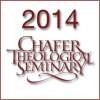
Tuesday, March 11, 2014
by Tommy Ice
Series: 2014 Chafer Theological Seminary Bible Conference
Duration: 1 hr 14 mins 31 secs
Dispensationalism is a system of theology (not a hermeneutical approach) that believes the Bible teaches God’s single plan for history is accomplished through Israel and the church for the purpose of His glorification. This theology arises from a consistent use of the grammatical-historical hermeneutic, also known as literal interpretation. While salvation of mankind is of extreme importance, it is accomplished within the broader purpose of the glorification of God, which is demonstrated through the various administrations of dispensational arrangements of history and also encompasses the angelic realm. Jesus Christ is the hero of history by leaving heaven and humbling Himself as a Man, winning the victory at the cross, rising from the dead, ascending to heaven, taking His bride at the Rapture, returning triumphantly at the Second Coming, and reigning for a thousand years from Jerusalem. Traditional dispensationalism attempts to systematize biblical teaching for the purpose of glorifying God through Jesus Christ. History is seen as a progression of ages in which God tests mankind, man always fails, and God judges humanity, but always provides a grace to the elect.

Tuesday, March 11, 2014
by Mike Stallard
Series: 2014 Chafer Theological Seminary Bible Conference
Duration: 55 mins 41 secs
Arno C. Gaebelein was a leading fundamental, dispensational Bible teacher in the early half of the twentieth century. He served as one of the associate editors of the Scofield Reference Bible and left us thousands of pages of material in his writings. The theological content of these many writings emphasized three things: inspiration of the Bible, the centrality of Christ at a personal level, and eschatological issues. It is fairly easy to determine a precise statement of the central interpretive motif or integrating idea in Gaebelein’s thought. Bible inspiration can be ruled out simply because it does not integrate the content of Gaebelein’s theology although it does provide a hermeneutical basis. The centrality of Christ is clearly stated. However, the sheer weight of discussion of eschatology, with its various focuses, speaks as forcefully as many direct statements. Nonetheless, it is possible to merge the theological statements about the centrality of Christ with eschatology to produce one statement clarifying the integrating theme of Gaebelein’s theology. This can be done through the concept of prophetic hope which finds its fulfillment in the Second Coming of Christ. Thus, the central interpretive motif of Gaebelein’s theological formulations can be stated as prophetic hope centered in the personal Second Coming of Jesus Christ. That this theme truly integrates Gaebelein’s theological system will be seen by an examination of the individual and multiple expressions of prophetic hope which he outlined. However, it may be possible to see in these expressions, taken as a whole, the idea of a multi-faceted program of creation and redemption centered in Christ and leading to the glory of God. That is, unity from diversity can be seen in the light of this doxological purpose to biblical history as the greatness of our sovereign God is displayed.